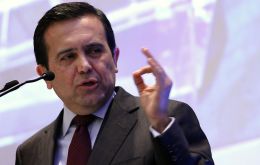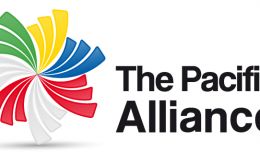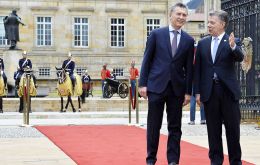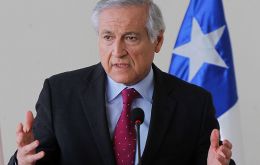MercoPress. South Atlantic News Agency
Pacific Alliance
-
Friday, July 1st 2016 - 09:08 UTC
“Possible surprise” in US elections must have the Pacific Alliance “ready to react”

The Pacific Alliance must be “ready to react” to a possible “surprise” in the United States presidential election, Mexican Economy Secretary Ildefonso Guajardo said in Chile on Thursday.
-
Friday, July 1st 2016 - 08:45 UTC
Pacific Alliance after stronger integration and closer links with the EU

The presidents of Chile, Colombia, Mexico and Peru, the four member states of the Pacific Alliance, met on Thursday in the Chilean town of Puerto Varas to strengthen their economic integration in order to deal with the ravages of global finance. They also called for closer links with the European Union to bolster education for development.
-
Friday, July 1st 2016 - 08:30 UTC
Pacific Alliance members plan financial integration investing pension funds in infrastructure

The Pacific Alliance must improve integration of financial systems to spur investment in key areas such as infrastructure, finance ministers from the four member nations said on Thursday. The group, composed of Colombia, Mexico, Chile, and Peru, has already reached several accords in areas such as free commerce and immigration rules, but admitted that significant opportunities for integration remained.
-
Thursday, June 30th 2016 - 15:46 UTC
Pacific Alliance summit in Chile convenes seven regional presidents

Six Latin American leaders and a president-elect will be participating in the two day Pacific Alliance business forum and presidential summit hosted by Chile and beginning on Thursday.
-
Wednesday, June 29th 2016 - 05:12 UTC
Pacific Alliance, under Chilean presidency will speed closer links with Mercosur

The Pacific Alliance under the helm of Chile, beginning next July first will reach out for closer links with Mercosur, particularly since Argentina's decision to join the block as an observer. “The Argentine decision to join the Pacific Alliance as an observer fully harmonizes with Chile's strategy of making both blocks converge”, according to Andres Rebolledo, head of Chile's Directorate of International Economic Relations.
-
Thursday, June 16th 2016 - 08:20 UTC
Canada and Pacific Alliance establish long term strategic partnership

Canada became the first observer country to enter into a strategic partnership with the Pacific Alliance. Chrystia Freeland, minister of International trade and ministers of the four countries of the alliance—Chile, Colombia, Mexico and Peru—signed a joint declaration today in Mexico City.
-
Thursday, June 16th 2016 - 07:25 UTC
Macri attends economic forum in Colombia; reaffirms Argentina's commitment to the Pacific Alliance

Argentine president Mauricio Macri said Mercosur needs “a greater integration dynamics” and defended the idea that the Atlantic regional block country members work to reach agreements with countries of the Pacific Alliance.
-
Monday, June 13th 2016 - 17:20 UTC
Chilean salmon industry controversy over the use of antibiotics

The use of antibiotics in the Chilean salmon industry reached 557 tons in 2015, according to the latest report of the National Fisheries and Aquaculture Service (SERNAPESCA), a figure consolidating the tendency to their intensive use over the past five years.
-
Friday, June 10th 2016 - 08:13 UTC
Argentina closer to the Alliance of the Pacific; Macri expected at the summit in Chile

The Alliance of the Pacific approved Argentina's request to join the group as an observer country, signaling a new turn in president Mauricio Macri's foreign policy. The announcement was made by Chile's foreign minister Heraldo Munoz following the Alliance's Ministers Council in Mexico City in anticipation of the summit scheduled for July first.
-
Saturday, March 12th 2016 - 05:40 UTC
Chile's challenge: disposing 27.700 tons of algae/bloom dead salmon

More than 27,733 tons, equivalent to 72% of the total salmon mortality caused by algae bloom, have been removed from the farms affected by this contingency, Chile's National Fisheries and Aquaculture Service (Sernapesca) informed. In a new report on the emergency affecting the salmon farming industry in the Chilean southern region of Los Lagos, Sernapesca pointed out that 38 farms have been affected by microalgae bloom in the Concession Groups (ACS) 1, 2, 3A, 6, 7, and 10B, with a total mortality amounting to 23.8 million fish, equivalent to more than 38,500 tons.